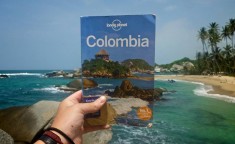November 11, 2013
BBC Trust report on BBC Worldwide’s handling of Lonely Planet reveals huge mistakes
by Zeljka Marosevic
Earlier this year, I reported on the news that Lonely Planet, the largest travel guide book publisher in the world, was planning a ‘global overhaul’ that would involve editorial and publishing job losses. Lonely Planet had recently been sold by BBC Worldwide to another company, NC2 Media, and seemed to be in something of a mess.
Now a new report from the BBC Trust, a governing body of the BBC, which aims to monitor and assess the corporation’s work, has concluded that “Mistakes were made in the acquisition and handling of Lonely Planet” by BBC Worldwide. As reported in the Bookseller, BBC Worldwide got its financial estimations wrong:
BBC Worldwide paid £132m over two stages (in 2007 and 2011) to own 100% of the business, investing a further £20m, but sold it last March to media company NC2 for just £51.5m.
Not only this, but BBC Worldwide underestimated the work that would need to be done to modernise Lonely Planet:
“Lonely Planet/BBCW was too slow in reacting to fast-changing markets. It seemed to lack a team experienced in online travel and e-commerce which would have enabled more effective decision-making and quicker reaction to the revenue opportunity, with the result that Lonely Planet might have adopted the TripAdvisor model or successfully ridden the subsequent social accommodation wave.”
As the quote above shows, in identifying the failures of the undertaking, the report also reveals the plans BBC Worldwide had for the company. And they appear to have been spookily similar the scenario playing out over at NC2 Media now, where they plan to swap editorial nous with crowd-sourced content, i.e. the ‘TripAdvisor model”.
So too, BBC Worldwide were hoping on “migrating the website to London and reducing costs and matching the cost base to where the revenues were being made”, which may have resulted in the same decision made at NC2 Media, where the company is aiming for “’destination editors’ based in London who will commission all written work.”
Still, while NC2 Media’s intentions have indicated downsizing, BBC Worldwide had more ambitious plans for other aspects of the company, namely “migrating Lonely Planet’s business on to other platforms, especially online and TV”, and perhaps these bigger ventures would have been provided better financial support for its book publishing arm.
In true BBC fashion, Vice-Chairman of the Trust Diane Coyle commented that:
“It is important to view the significant financial loss from Lonely Planet against the backdrop of a sustained strong performance from BBC Worldwide as a whole, which brings significant benefits to licence fee payers.”
The report also notes that BBC Worldwide could not have predicted, “the significant and unforeseen appreciation of the A[merican]$, the Global Financial Crisis and structural pressures in the book retailing market.”
And what have we learnt? That Lonely Planet was destined for big upheaval even when NC2 Media bought it, that the “TripAdvisor” model seemed inevitable for quite some time, and that through BBC Worldwide’s mismanagement and the ignoring of signs that “all was not well”, Lonely Planet lost its powerful and ambitious advocate.
Zeljka Marosevic is the managing director of Melville House UK.
